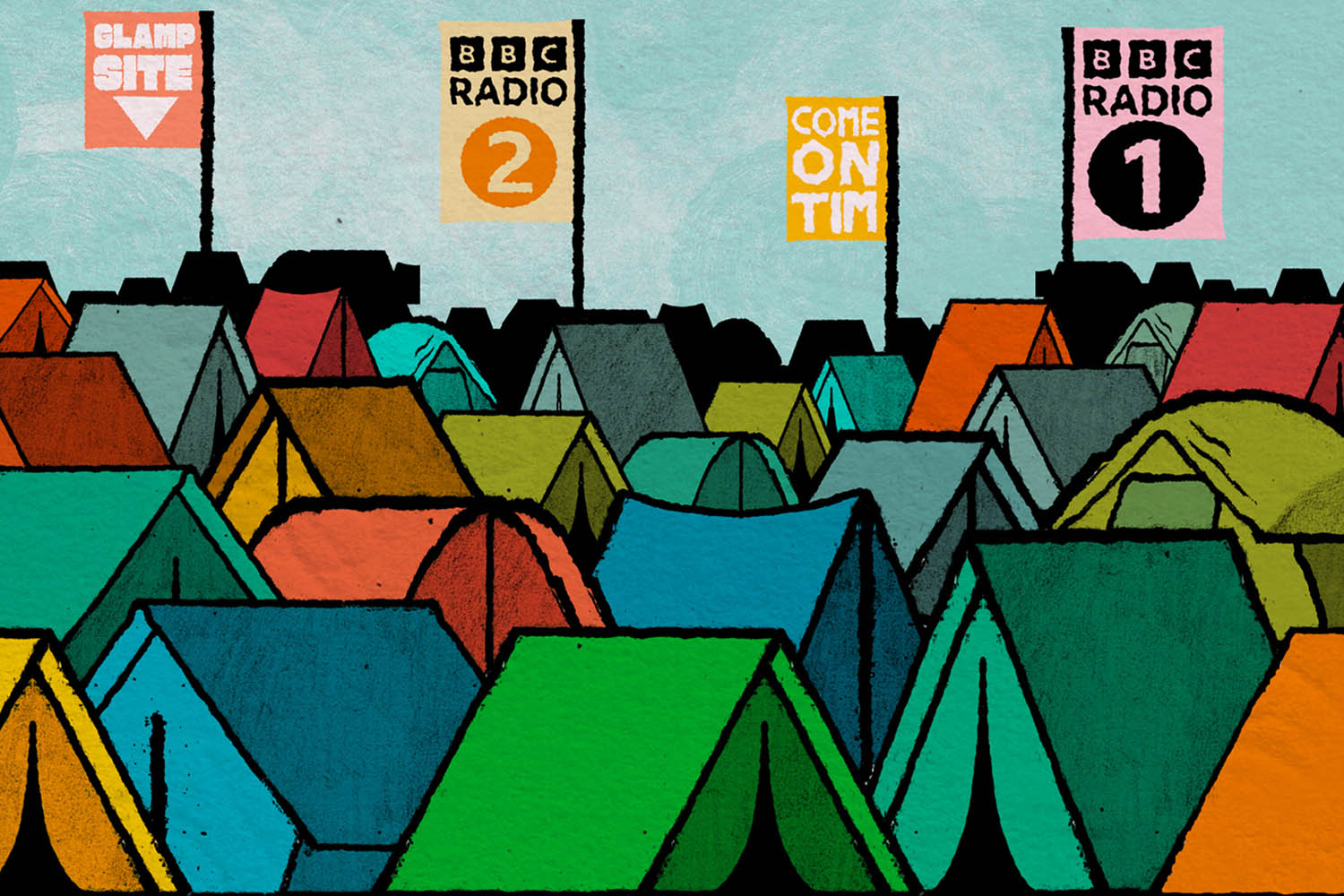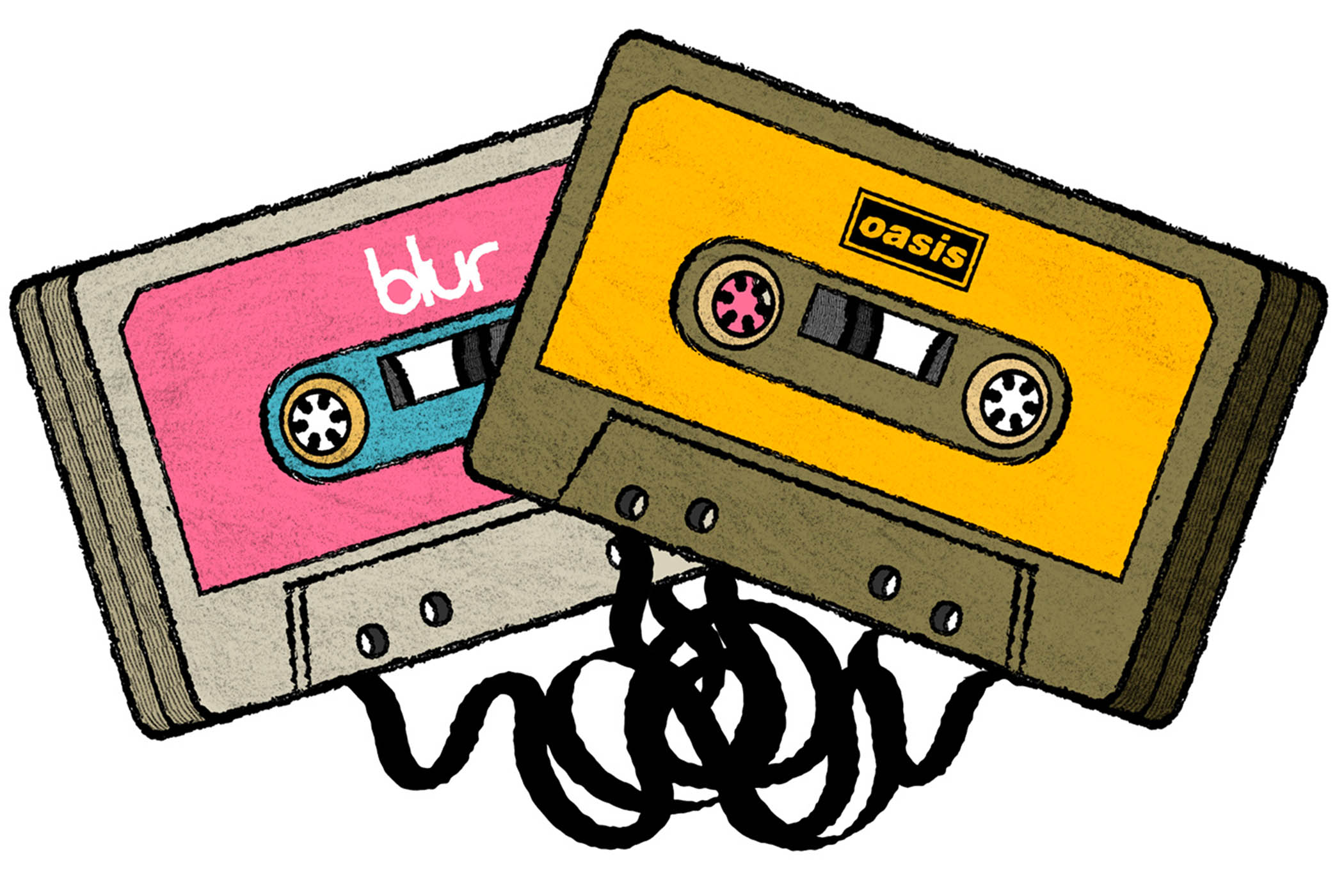Illustration by David Foldvari
Glastonbury is annoying. It’s an event that has annoyed me since I first heard about it. This, I have always thought, is not my sort of thing at all. It sounds horrible. How annoying that it exists, and how even more annoying that so many people like it or affect to like it. And how annoying that I know about it. How annoying that I know it is literally happening now. How annoying that I even vaguely know whereabouts it happens.
How annoying that I know that its main stage is called the “Pyramid Stage”. I lose objects, forget passwords, spend 2% of every day re-Googling household names that have dropped out of my head and, at parties, regularly blank warm acquaintances with whom I have at some point worked for weeks or months, all thanks to a flawed and declining brain that has nevertheless absorbed and retained the name of the big stage in the middle of a grim-sounding festival of mud, drugs and self-regard that I have resolved never to attend.
I’m not proud of my annoyance. I wish it were otherwise. It’s very predictable and boring coming from someone like me. You may not know what I’m like – there’s no reason why you should. It’s not a prerequisite for reading this column. Far from it – I welcome new custom. And who knows what anyone’s really like? Can any of us fully know another person? A human personality is like the Mandelbrot set – the closer you zoom in, the more intricately complex, albeit in a fairly predictable way, it becomes. But, in summary, what I am like is someone who would find Glastonbury annoying. In terms of image, the vast majority of the global population is less like Jacob Rees-Mogg than I am.
Which is not to say I consider myself to be similar to Jacob Rees-Mogg. I find the suggestion offensive. But perhaps my self-image isn’t the main thing. There’s an infinity of concepts in the universe and, standing with Jacob alongside pufferfish, black holes, Tesco, the Orkney Islands, hydrochloric acid and a sausage sandwich, perhaps I need to get over myself and accept that we’re relatively alike. I don’t want to be like a gerbil moaning: “I’m nothing like a hamster! I don’t eat my young!” There is no suggestion that Jacob Rees-Mogg eats his young.
To be honest, Rees-Mogg is a defter image-maker than I am, so is relatively likely to have at some point enthused about the Glastonbury festival. You can imagine it being a photo-op when he was business secretary. It’s good for the GDP, near his constituency and has a clear pro-enterprise message: who needs EU farming subsidies when, with a little bit of gumption, you can simply organise the biggest music festival in Europe? Farmers don’t want handouts! In the absence of an Eavis, rope in Lulu as someone who has previously both played Glastonbury and voted Tory. Rees-Mogg has a twinkle in his eye and he’s not above being the sort of stuck-up dean who finds himself boogying with the girls in the pool by the end of the movie.
The swathe of Somerset that the festival is inflicted on still looks like a dystopian hellswamp by the end
The swathe of Somerset that the festival is inflicted on still looks like a dystopian hellswamp by the end
But I won’t do that, even if it would be well received. Saying the opposite of what you feel just to be surprising isn’t broad-mindedness; it’s meretricious contrarianism. As the kids say. Glastonbury festival sounds awful: noisy, muddy, druggy and, worst of all, relentlessly fashionable.
Why do I need to mention it at all? Well, for a start, I wasn’t going to write this column about Iran. And, for a continuation, the BBC’s head of popular music for television, Jonathan Rothery, last week said Glastonbury was such a big deal it was “akin to a sporting event like Wimbledon or a World Cup”. According to him, everyone likes it now: “It’s gone from the 1990s, when it was a brilliant festival but had a very specific demographic, to now being a very broad church, reflective of everybody,” he enthused. “It’s multi-generational. Even my dad watches it, and he wasn’t aware of it 10 years ago.”
Related articles:
Taking the last point first, his dad isn’t a random senior citizen; he is the father of the man who, as head of popular music at the BBC, commissioned its extensive Glastonbury coverage. It probably came up at Christmas lunch. I mean, my dad is 78 and has watched every single episode of Peep Show, but I’m not sure that alone is proof of the programme’s multi-generational reach. (Apologies to new customers – feel free to Google.)
But maybe Rothery is right. Perhaps Glasto has gone mainstream. Even I’ve started calling it Glasto – the time-saving has become significant in my life. It feels like everyone talks about it more every year. And an aura of exclusivity rather than rebelliousness has developed around the act of going. The tickets are sold instantly and cost a fortune, and then you must, if you have an iota of self-respect, somehow acquire access to one of the glampier areas where the standard of accommodation approaches the level of the better-appointed refugee camps.
Newsletters
Choose the newsletters you want to receive
View more
For information about how The Observer protects your data, read our Privacy Policy
The swathe of Somerset that it’s inflicted on still looks like a dystopian hellswamp by the end, but the affluence and organisation required in advance smack of bourgeois efficiency rather than hippyish liberation. All the drinking and substance abuse is pre-empted by careful planning and booking. Radio 2 is there to cover it, and so is BBC One, everyone clean and presentable and bursting with pre-watershed positivity. The whole counter-cultural phenomenon reduced to a plucky cry of “Come on, Tim!”
Surely that means it’s doomed? Long-term, it can’t survive this bland consensus. We live on an island bristling with buildings. There’s no need to pay a fortune to experience music and inebriation in the rain. There are stadiums, arenas, theatres, concert halls. There are Airbnbs, Travelodges, Premier Inns and, for glamping prices, five-star hotels. The only thing driving this event, from the very start, was that most people didn’t do that sort of thing. To survive, it must remain, ostensibly at least, a bit of an out-there cultural choice. It needs the annoyance of me and people like me to energise it. Without that, the whiff of marijuana is overwhelmed by the stench of the chemical toilet.



